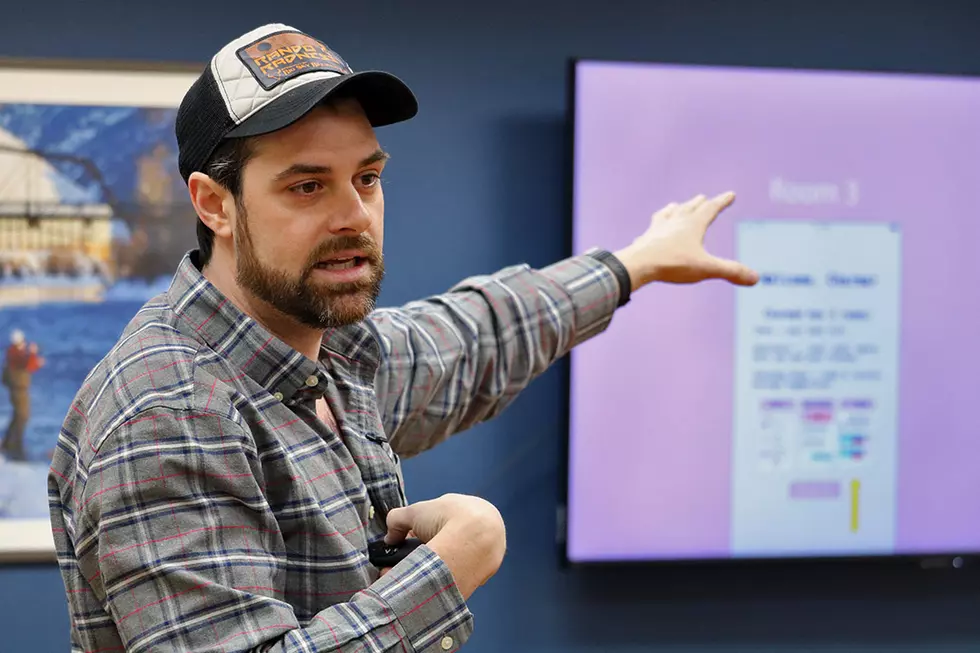
Dating to disasters: Missoula entrepreneurs practice their pitch ahead of state event
When Taylor Margot looks at today's dating scene, he's sees a collective wooing. Once upon a time, it played out in public, though times have changed.
And he thinks he has a solution.
“Historically, almost never did dating happen in a vacuum,” he said. “But modern dating is different, and now it often does happen in a vacuum, and that vacuum is the online dating apps.”
Margot joined three other Missoula entrepreneurs on Wednesday in giving his startup pitch a practice run at 1 Million Cups, using its members as a proving ground ahead of Thursday night's Early Stage Montana pitch competition.
Back in 1995, Margot said, just 2 percent of new relationships formed online. New data suggests that 39 percent of those relationships now start online, though dating apps aren't so good at the follow-through.
Margot believes that just 30 percent of dating app users have actually met in person by using the service. Their efforts generally fail at an early stage and those that break through find themselves at a loss for words, unsure of what to say if they say anything at all.
Dating app users need their friends, Margot said, and they do so by taking screenshots of their conversations and seeking advice. He now plans to do it for them.
“From our survey, 72 percent of the people on dating apps are already doing this, taking screen shots and sending them to their friends,” he said. “The behavioral pattern is in place. Of those, half are specifically looking for advice.”
Margot and his partners have developed “a software solution to a hardware problem” that offers that advice from trusted friends. Their new dating app integrates with existing dating apps, including Tinder, and includes a variety of options, including separate chat rooms and advice sought by mood, from romantic to sarcastic.
While it's intended for a younger audience, he said, it has gained interest from 40-somethings looking to get back into the dating scene.
“We've viable right now, we've got demand, we've shown some traction and we've got active users,” he said. “We think Charmed is going to be a big thing.”
Geoff Gilbert has developed an app to improve service in the mobile food industry. The owner of an ice cream truck, he's looking to better connect fellow vendors with their customers in the digital age.
While he's not the first to make the effort, he believes his new app, Inside Scoop, is superior to other products on the market.
“Others have created mobile food-truck apps, but they're not that good,” he said. “They're still mostly created from the eater's perspective. If we focus more on the trucks and not just the eaters, we can become the solution for them, and help streamline their social media presence.”
Wednesday morning's pitch session gave participants a practice run ahead of Thursday night's main event at Early Stage Montana, where the stakes are high and potentially lucrative for a startup business seeking funding.
Following the success of last year's inaugural event, this year's Early Stage Montana includes three regional competitions, mentoring from expert coaches and a statewide showcase with potential investors and seed funding.
Marc Dousset, founder of re:Permit, believes his product has a shot. The Missoula company looks to streamline the permitting process in as little as one click, providing more clarity for a legally enforceable document.
As it currently stands, Dousset said, drafting permits is time consuming and often inconsistent. That leads to confusion, enforcement challenges and the need for additional review.
“Our system generates each document in as little as one click, leveraging any information captured in the application,” he said. “Our research so far indicates the greatest need within environmental health. That includes water and air quality, public water supplies, subdivision and sanitation.”
Tom Donahue, founder of DRIMS, will also vie for the prize on Thursday night. His service, Disaster Recovery Integrated Management System, traces its roots back to Hurricane Katrina in New Orleans and looks to cover inefficiencies in the response to natural disasters.
“We know first hand – I've seen it first hand – doing the work with people who've been devastated by these storms and understanding the need for long-term recovery,” he said. “When you look at the processes that happen between organizations, agencies and the people impacted by these storms, it's completely inefficient.”
